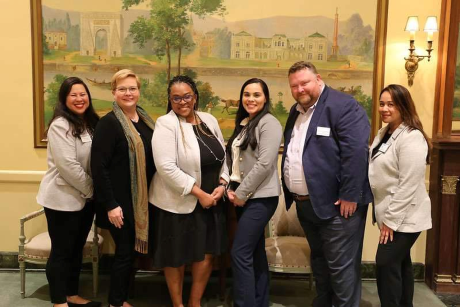East Meets West Law School Consortium Demystifies Admissions Process
RWU Law’s Associate Dean Michael Donnelly-Boylen Leads the Charge in Creating a Leading Source of Law School Applicant Information – on TikTok

The law school admissions process is an arduous one that can often cause a great deal of anxiety. Contributing to that anxiety is the large amount of incorrect information surrounding the process, information that often comes from misinformed sources. To combat misinformation and guide students towards accurate information, RWU Law has been at the forefront of an initiative designed to demystify the law school admissions process and dispel factual inaccuracies.
The East Meets West Law School Consortium is the brainchild of RWU Law’s Associate Dean for Enrollment & Strategic Initiatives Michael Donnelly-Boylen and Tracy Simmons, the Associate Dean of Admissions & Students Affairs at Howard University School of Law. The two began the project over Zoom during the COVID 19 lockdown in order to give law school applicants a reliable virtual resource when travel and in-person events were not possible. “From the start of the consortium, our goal has been to bring clear insights to everyone, whether they are applying to our school or not,” says Donnelly-Boylen. “It quickly became a forum where we spent the majority of the time providing as much unbiased information about the admissions process to potential applicants as possible.”
When it started, the Consortium consisted of the admissions deans of three East Coast Law Schools – Donnelly-Boylen of RWU Law, Joan Metzler of Quinnipiac Law and Ella Mae Estrada of New York Law School – and three West Coast Law School admissions deans – Simmons then of McGeorge School of Law, Cristina Arteaga of the University of Washington School of Law and Lisa Gear of Southwestern Law School. The initial make-up gave the consortium its name. All of the admissions deans had something else in common – they were either First Generation College students themselves or BIPOC. Those common experiences led to a shared mission to educate applicants and a promise not to use the consortium as a vehicle for competition. Says Donnelly-Boylen, “We are not trying to keep any secrets or be gatekeepers. We all want to make sure that the correct information is out there for everyone. We know what those struggles are like.”
Misinformed and Misguided
The majority of incorrect information that potential applicants are exposed to is found online. Sites like Reddit have threads dedicated to the law school admissions process that applicants find helpful because it is information from their peers, which they often see as more honest or unbiased than advice from institutional sources. While this can sometimes be the case, such information can have a narrower focus given that it is based on a single person’s experience; the information may be true in regard to that one person but should not be seen as a guiding principle for all. Oftentimes, someone who has had a negative experience in the admissions process will post about it, implying that their experience is universal when that it may not be the case. In other instances, someone will post about his or her experiences in good faith, but as information gets passed from person to person, it gets distorted.
The consortium schools are committed to providing the correct information to all potential applicants, regardless of whether or not they apply to any of the consortium member schools. For the consortium, it is about the integrity of the admissions process and ensuring that every person applying has access to all the tools they need to create the strongest application possible. “We are here to make sure that no matter who you are, you have access to free, accurate and useable information about applying to law school,” says Simmons.
TikTok Drives Post-Pandemic Growth
Despite an initial focus on the coasts, the consortium found that its virtual events were attracting strong online attendance throughout the United States, which was a testament to the universal nature of their content and the high demand for such content.
In August 2022, the group began to use TikTok as a platform to help as many applicants as possible get easy access to advice about applying to law school. They’ve now posted hundreds of videos at @eastmeetswestlaw on TikTok that cover a wide range of law admissions topics. “Applicants have quoted advice directly from our TikTok account,” says Simmons. “Many applicants have commented that we reduced their stress and anxiety about the process. We had no idea how useful TikTok would be in broadening our audience.” One year in, the consortium’s TikTok account has over 3.000 followers and its videos are averaging over 20,000 views per week.
“We are by far the leading group of law schools in this space helping applicants figure out how to do this, whether they are interested in us specifically or not,” says Donnelly- Boylen. “At events al around the country now, applicants regularly come to our tables to thank us for making the law school admissions process as transparent as possible, and for helping them on their journey.”
For the full library of the consortium’s TikTok content, go to @eastmeetswestlaw

